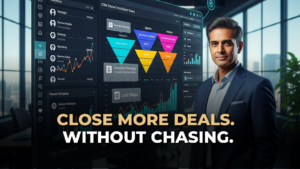Most entrepreneurs never break past six or seven figures—not because they lack hustle, but because they’re chasing the wrong game. They grind for volume sales, haggle with low ticket customers, and spend their days trying to convince people who think $99 is too expensive.
That game doesn’t scale.
If that’s where you are right now, here’s the truth: You don’t build a million-dollar business by making a million small sales. You build it by making fewer transactions—but at a higher price point.
That’s the essence of high ticket sales.
Table of Contents
- High Ticket vs. Low Ticket Sales: Why the Gap Feels So Big
- Understanding High Ticket Products
- What Makes a Product Truly High Ticket?
- Why This Matters for Your Sales Team
- What Makes High Ticket Sales Work So Well?
- Why High Ticket Sales Work—Even in a Crowded Market
- Why Fewer Sales Can Mean More Revenue
- High Ticket Meets High Expectations
- The Psychology of the High Ticket Buyer
- Building a High Ticket Offer That Sells Itself
- Pricing Strategy for High Ticket Sales: Stop Undervaluing Your Offer
- Bonus Tactics That Increase Perceived Value
- Positioning Yourself as the Only Logical Choice
- Creating a High Ticket Sales Funnel That Converts
- Mastering the High Ticket Sales Call
- Becoming a High Ticket Sales Closer
- Cross Selling and Upselling in High Ticket Sales
- Sales Automation for High Ticket Offers
- Common Mistakes to Avoid in High Ticket Sales
- Measuring Success in High Ticket Sales
- Continuous Improvement: How the Top 1% Stay Ahead in High Ticket Sales
- The Future of High Ticket Sales
- Final Thoughts: Ready to Go High Ticket?
- Ready to Build an Offer That Sells Itself?
What is High Ticket Sales? Understanding What It Actually Means
High ticket sales refer to selling premium products or services that typically range from $3,000 to $100,000 or more. A high ticket item is a product or service with a high price point that requires a specific pricing strategy, such as value-based pricing or psychological tactics, to effectively position and sell it. These are not impulse buys—they’re significant investments made by serious clients looking for serious results.
This isn’t just about raising your prices.
It’s about repositioning your entire offer:
- From features to transformations
- From transactions to relationships
- From quantity to quality
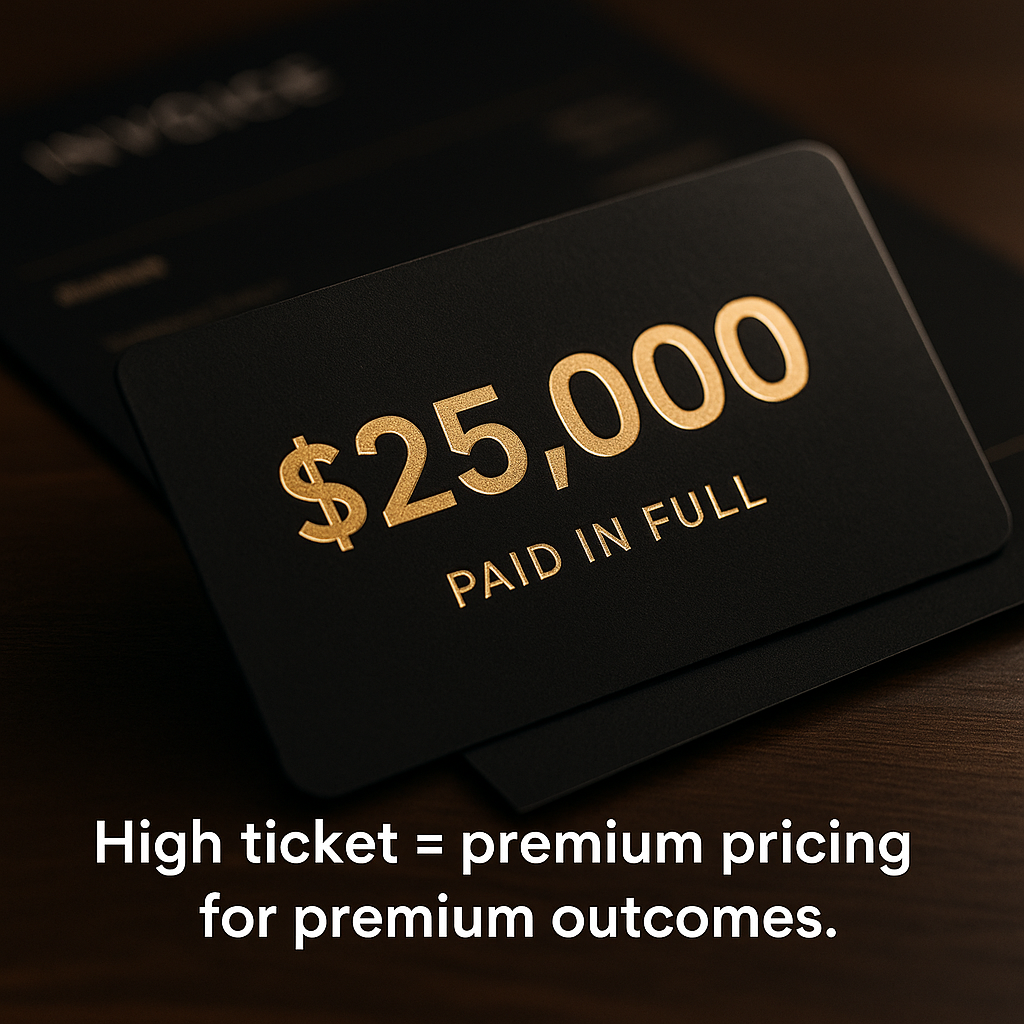
The high ticket model isn’t for everyone—but it is for the entrepreneur who’s ready to play bigger. High ticket sales focus on attracting fewer customers and require fewer transactions to achieve substantial revenue. If you’re tired of chasing scraps and want to start closing real deals with real clients… this guide will show you how high ticket sales work—and how to master them.
We’ll also share high ticket sales examples from different industries to illustrate these strategies in action.
High Ticket vs. Low Ticket Sales: Why the Gap Feels So Big
If you’re selling a $47 course or a $97 coaching session… you need to close hundreds—sometimes thousands—of sales every month just to hit your income goals. Low ticket businesses depend on volume sales, focusing on attracting a large number of price-sensitive buyers to reach their revenue targets.
That’s the grind of low ticket sales:
- Constantly launching
- Running discounts
- Chasing low ticket customers who are more likely to ask, “Do you offer refunds?” than “How can we scale this together?”
The math doesn’t lie. Let’s say your monthly income target is $30,000:
- Sell a $97 product → you need 309 buyers
- Sell a $10,000 high ticket offer → you need just 3
That’s the difference between burnout and leverage.
Understanding High Ticket Products
High ticket products aren’t just expensive.
They’re engineered for one thing: to deliver superior results to premium clients.
In this game, you’re not selling information.
You’re selling certainty, speed, exclusivity—and transformation.
If your offer feels like an “off-the-shelf” solution, don’t expect high ticket buyers to take you seriously.
These clients don’t want features—they want outcomes.
They don’t want options—they want the best.
What Makes a Product Truly High Ticket?
It’s not the price tag. It’s the positioning.
A true high ticket product:
- Solves a painful, urgent problem
- Offers exceptional quality and personalized service
- Is backed by proof, authority, and a rock-solid value proposition
Whether you’re selling online courses, enterprise software, or private consulting—your job is to create a solution that commands attention and closes deals based on value, not price.
Why This Matters for Your Sales Team
If you or your sales team can’t clearly articulate why your offer is worth $10K, $25K, or $100K…
don’t be surprised when clients hesitate.
High ticket clients want to know three things:
- Can you solve my specific problem?
- Can I trust you?
- Is this worth the investment?
When you position your product with confidence, back it with track record, and lead with a sharp sales strategy, you stop attracting tire-kickers…
…and start closing top high ticket sales with clients who value what you do.
Bottom Line?
If you want to sell high ticket, you better think high ticket.
Because the more powerfully you understand your offer,
the easier it becomes to attract premium clients, close deals fast, and drive substantial revenue—without ever lowering your price.
What Makes High Ticket Sales Work So Well?
High ticket clients think differently. They don’t shop based on price—they invest based on outcomes, expertise, and speed.
They’re not buying a coaching program. They’re buying clarity, results, and a shortcut to the goal.
They don’t want cheap—they want the best.
That’s why high ticket products allow for higher profit margins. You’re not just trading time for money. You’re positioning yourself as a premium solution in a sea of generic offers.
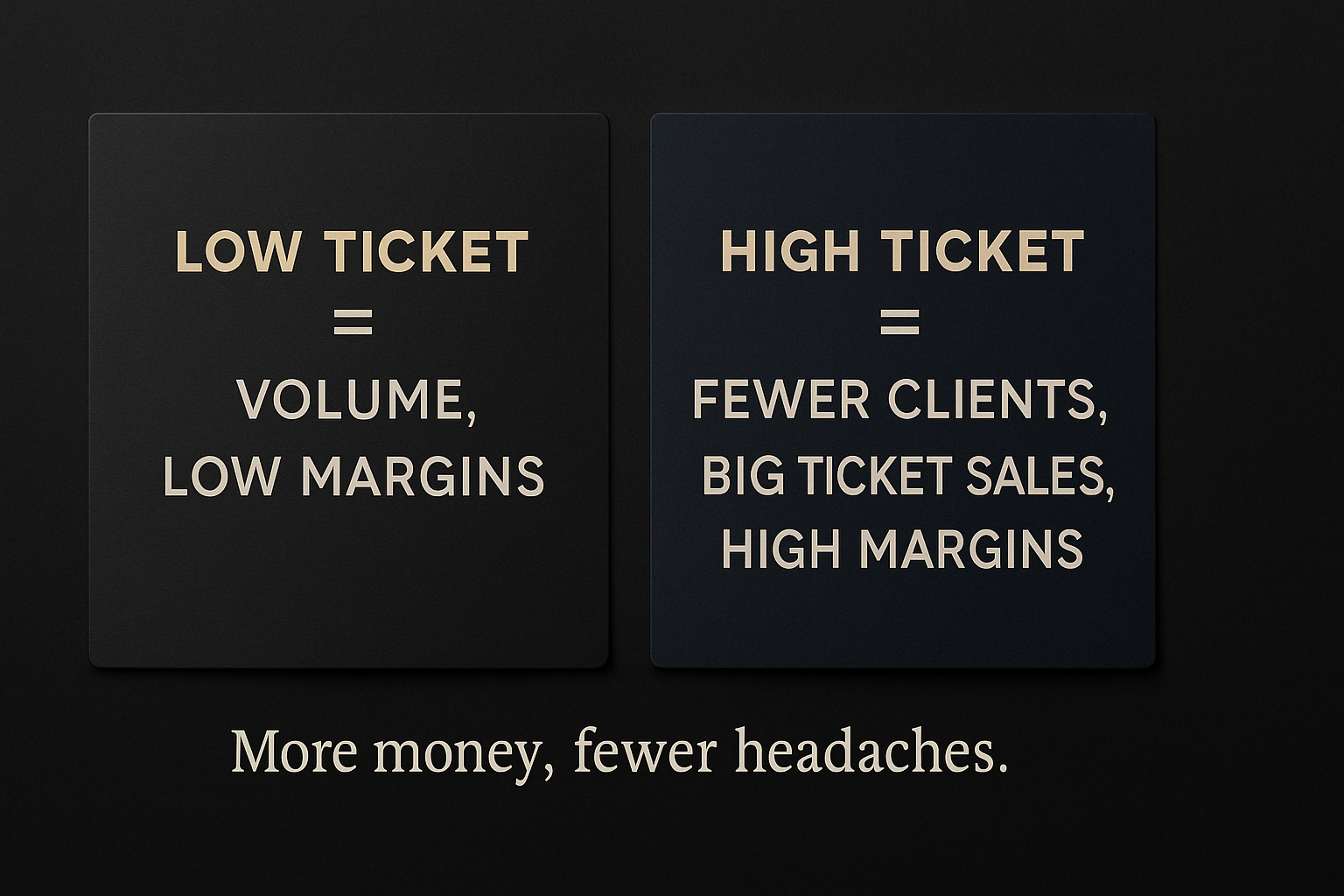
The Takeaway?
If you’re constantly launching, relaunching, and still feeling broke… it’s time to rethink your offer.
Low ticket sales rely on quantity. High ticket sales create leverage.
If you want to scale fast, attract serious buyers, and escape the feast-or-famine cycle…
High ticket is the smarter play.
Why High Ticket Sales Work—Even in a Crowded Market
Let’s be clear: High ticket sales work not because of luck or hype—but because they’re built on a smarter business model.
When you charge premium pricing for a premium outcome, a few important things happen:
- You attract better clients.People who pay $10,000+ show up differently than those who spend $99. They’re decisive, committed, and focused on ROI.
- You simplify your operations.You can scale without hiring a massive team, launching new offers every quarter, or managing hundreds of customer service tickets.
- You create space to deliver exceptional quality.Instead of burning out trying to serve hundreds, you go deeper with a handful of high ticket clients—and get them better results.
- You can deliver a premium offering with superior quality.High ticket sales allow you to provide a premium offering that emphasizes superior quality, attracting discerning clients who value exclusivity and an enhanced customer experience.

Why Fewer Sales Can Mean More Revenue
Here’s the counterintuitive truth:
Fewer sales = higher income, if those sales are structured correctly.
Most entrepreneurs chase revenue through volume. But volume brings complexity.
High ticket sales flip the formula by delivering higher profit margins with less noise.
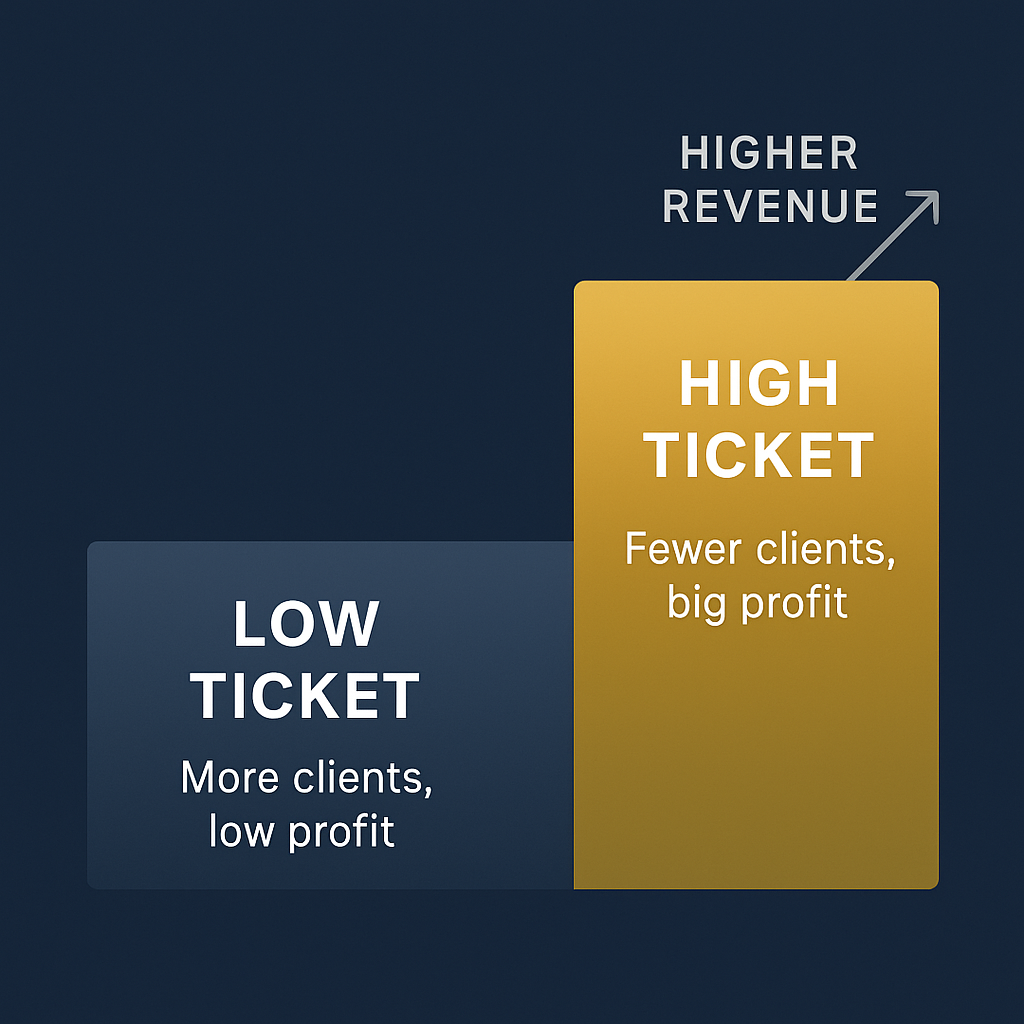
When you move from low ticket offers to big ticket sales, you stop selling your time—and start selling transformation, status, and certainty.
High Ticket Meets High Expectations
It’s not just about charging more—it’s about delivering more.
High ticket buyers have higher expectations, but that’s what sets elite brands apart. When your offer is backed by:
- A clear value proposition
- A premium brand experience
- And world-class customer satisfaction
…you don’t need to “sell” people. You simply show them what’s possible.
And they say, “I’m in.”
The Psychology of the High Ticket Buyer
If you want to master high ticket sales, you need to understand who you’re selling to.
High ticket buyers are not casual shoppers. They’re not impulse buyers. They’re strategic decision-makers who think in terms of outcomes, leverage, and speed.
They’re investing in:
- Status: Being associated with elite solutions.
- Certainty: Trusting the result will justify the price.
- Time-saving: Buying access, shortcuts, or fast-tracked results.
They expect premium quality—but more than that, they expect clarity.
What am I getting? How will it transform me or my business? Why are you the right person?
High Ticket = High Expectations
The bigger the investment, the greater the expectation.
These clients will:
- Evaluate your brand experience
- Judge your authority within seconds
- Research your track record before buying
And that’s a good thing—because once they commit, they’re all in.
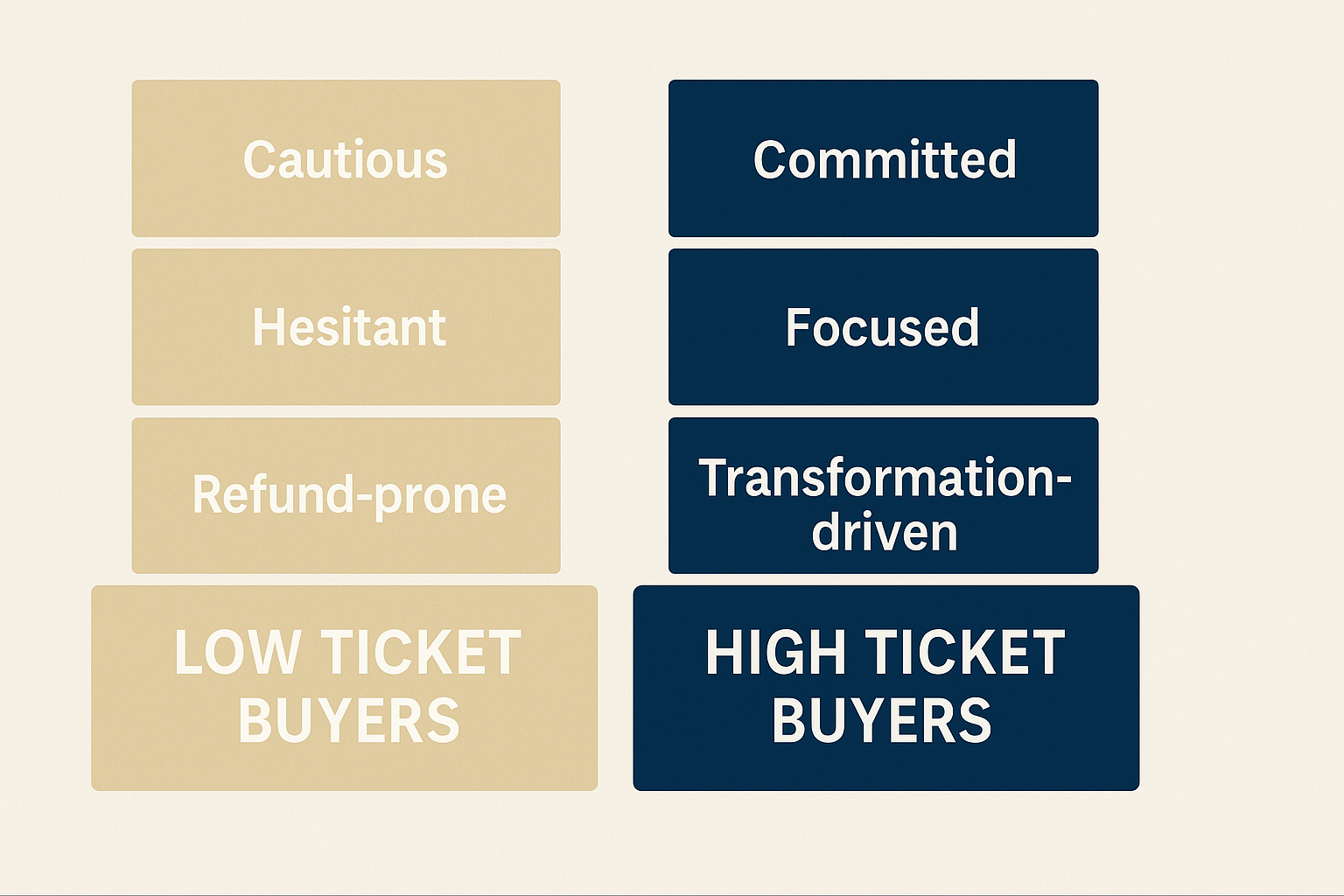
Bottom line?
High ticket customers don’t need to be convinced—
they need to be clear on the value.
Building a High Ticket Offer That Sells Itself
You can’t sell a $10,000 offer with $100 thinking.
High ticket offers demand a different mindset—and a different structure.
Here’s the truth:
Nobody buys a “package.” They buy a promise.
Your job is to create a premium product that delivers a clear, powerful transformation—and to position it like an outcome, not a to-do list.
What Makes a High Ticket Offer Irresistible?
Forget features. Forget modules. Forget “12 coaching calls + worksheets.”
Instead, craft an offer around these elements:
- The Outcome: What’s the result your client will walk away with?
- The Value Proposition: Why is this the fastest, most effective path to that outcome?
- The Delivery System: Can you deliver with speed, simplicity, and exceptional quality?
- The Experience: What level of service justifies the premium pricing?
Even online courses can be high ticket if they solve a painful problem, serve a niche market, and deliver deep results.
Pricing Strategy for High Ticket Sales: Stop Undervaluing Your Offer
Most entrepreneurs don’t charge enough—because they’re afraid.
Afraid they’ll lose the sale. Afraid they’re not “worth” the number. Afraid of rejection.
But here’s the truth:
Your price isn’t a guess. It’s a positioning tool.
In high ticket sales, your pricing strategy signals value, confidence, and transformation. It tells your high ticket buyers: “This isn’t cheap—and neither are the results.”
Use Value-Based Pricing—Not Cost-Based Thinking
You don’t price a premium offer based on what it costs you.
You price it based on what it’s worth to the client. To learn more about effective pricing strategies, explore these expert tips.
That’s value based pricing in action:
- Focus on outcomes, not inputs
- Anchor your offer to the transformation
- Align with what your potential clients are willing to invest to solve a painful problem fast
This justifies a high price point and attracts premium clients who value speed, certainty, and exceptional quality.
Advanced Pricing Models That Elevate Perceived Value
Want to increase perceived value and maximize revenue?
Consider these high ticket pricing strategies:
- Tiered Pricing: Let qualified buyers choose the level of access
- Bundled Offers: Stack services to amplify the transformation
- Premium Subscriptions: Deliver ongoing personalized service with predictable revenue
Each model positions you as the only logical choice for clients who want the best.
Final Word: Price Like a Leader
If you want to close more high ticket sales, stop justifying your price—and start owning it.
Because when you price with clarity, confidence, and a powerful value proposition, your best buyers won’t ask, “Why so much?”
They’ll say, “That makes sense. Let’s do it.”
Bonus Tactics That Increase Perceived Value
Want to increase price without increasing fulfillment?
- Add exclusive access: Private community, 1-on-1 support, or behind-the-scenes insights
- Use cross selling strategically: Offer complementary upgrades that deepen the transformation
- Build scarcity: Not everyone gets to work with you. That’s not a flaw—it’s a feature.
These strategies not only increase perceived value but also help build loyal customers who return and refer others.

Your high ticket offer doesn’t need to be complicated. It needs to be clear, outcome-focused, and backed by certainty.
If your offer solves the right problem for the right person at the right price— it becomes the only logical choice.
Positioning Yourself as the Only Logical Choice
High ticket clients don’t want options. They want certainty.
They’re not looking for “another coach” or “one of many consultants.” They’re looking for the best person to solve a specific problem—fast, confidently, and without excuses.
In a high ticket sales strategy, the goal isn’t just to sell. The goal is to make your offer feel inevitable. A strong online presence reinforces your authority and makes your offer the obvious choice for clients seeking expertise.
Build Brand Credibility Through Proof, Exclusivity, and Presence
Here’s what makes high ticket positioning powerful:
- Track Record: Your results speak louder than your pitch.
- Proof: Show testimonials, case studies, and quantifiable wins. Sharing these helps prospective customers overcome hesitations and trust your offer.
- Exclusivity: Not everyone gets access—and that’s intentional.
- Personalized Service: Every detail signals that this is not a cookie-cutter solution.
- Consistency: From your website to your follow-up emails, every touchpoint must reinforce your value.
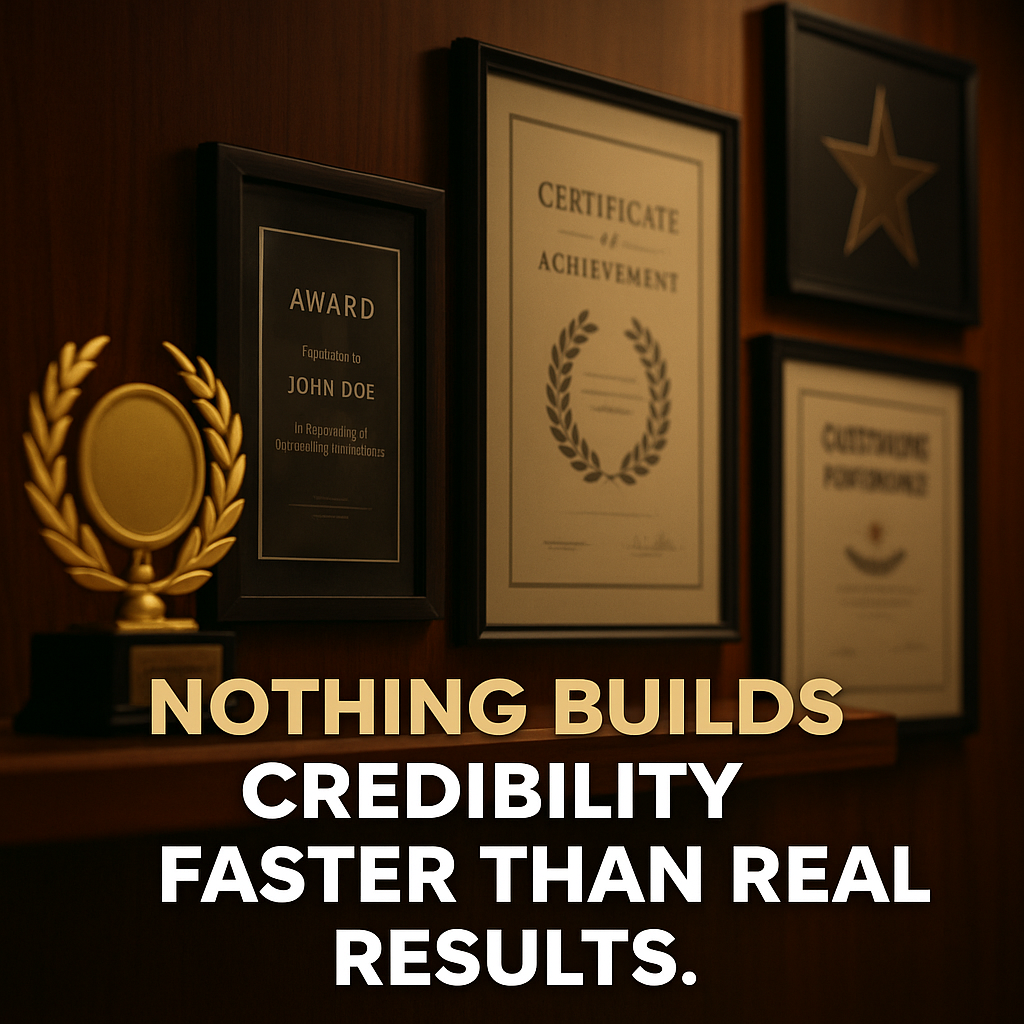
The Invisible Advantage: Authority Positioning
You’re not just selling a solution. You’re selling your expertise.
And the fastest way to gain authority is to act like you already have it.
When you position yourself as the expert—the one with the plan, the proof, and the posture—
high ticket clients follow your lead.
And when you do it right, they don’t ask “Why should I choose you?”
They ask, “How do I qualify?”

Creating a High Ticket Sales Funnel That Converts
You can have the perfect offer and the perfect message— but without a high ticket sales funnel, you’re leaving money on the table.
A high ticket sales funnel is essential for effective customer acquisition, especially in digital marketing for small businesses, as it helps attract new customers and drive business growth.
Why?
Because high ticket sales aren’t made on the first click. They’re made through a multi-step, trust-driven process that turns cold strangers into committed buyers.
The 3 Core Stages of a High Ticket Funnel
To acquire high ticket clients consistently, your sales funnel must:
- Attract the Right Target AudienceUse content, ads, or partnerships to speak directly to decision-makers—people with a painful problem and money to solve it. The goal is to attract and engage high ticket prospects who are ready for a premium solution.
- Engage & Qualify with Sales Engagement ToolsThis is where most drop the ball. Use applications, DMs, quizzes, or live events to filter potential clients and pre-frame them before the sales call.
- Convert with ConfidenceThe final step is your high ticket sales call—where you present the offer, frame the investment, and close.
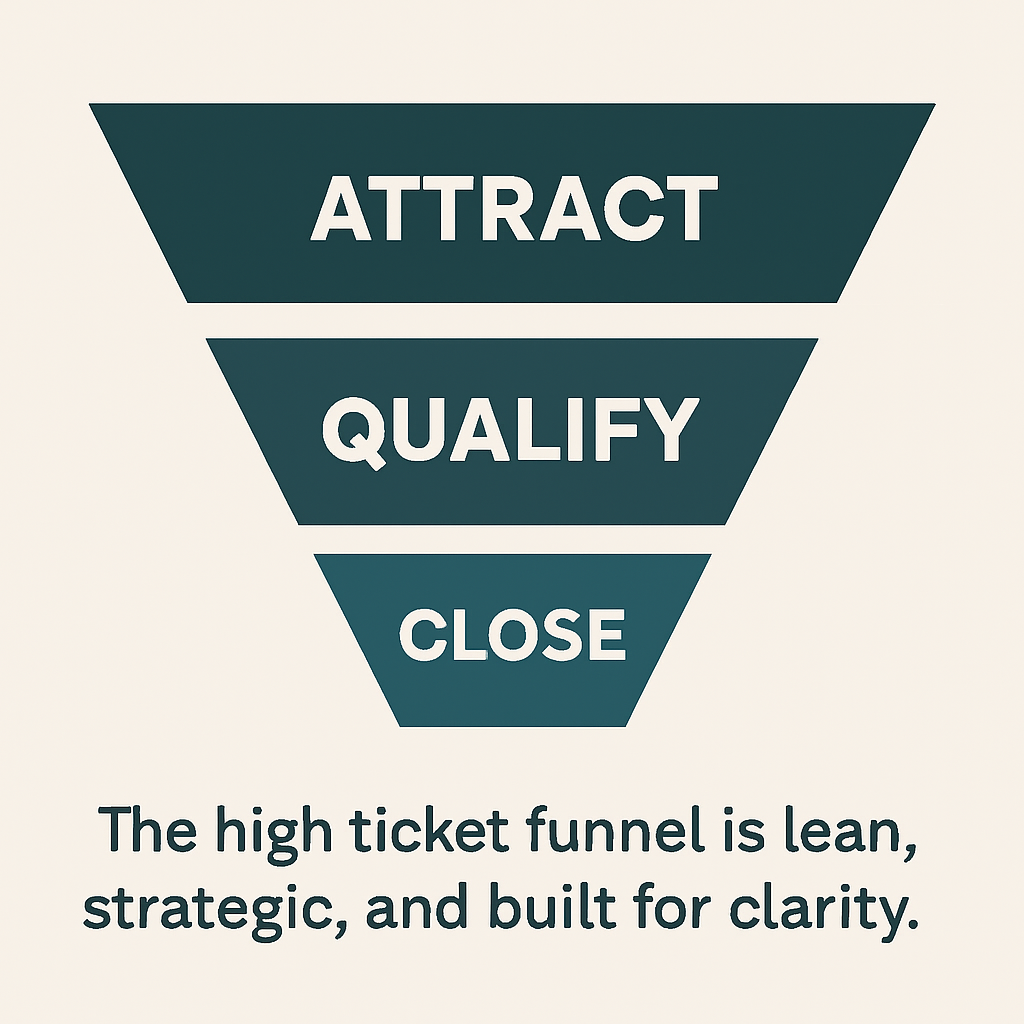
The Funnel Isn’t About Selling—It’s About Filtering
The best funnels don’t chase clients.
They filter out low-quality leads and elevate the serious ones.
Think of it as a client acquisition system that does the heavy lifting before you even get on a call.
When done right, you’ll step into every conversation with the right person, at the right time, with the right problem—ready to say yes.
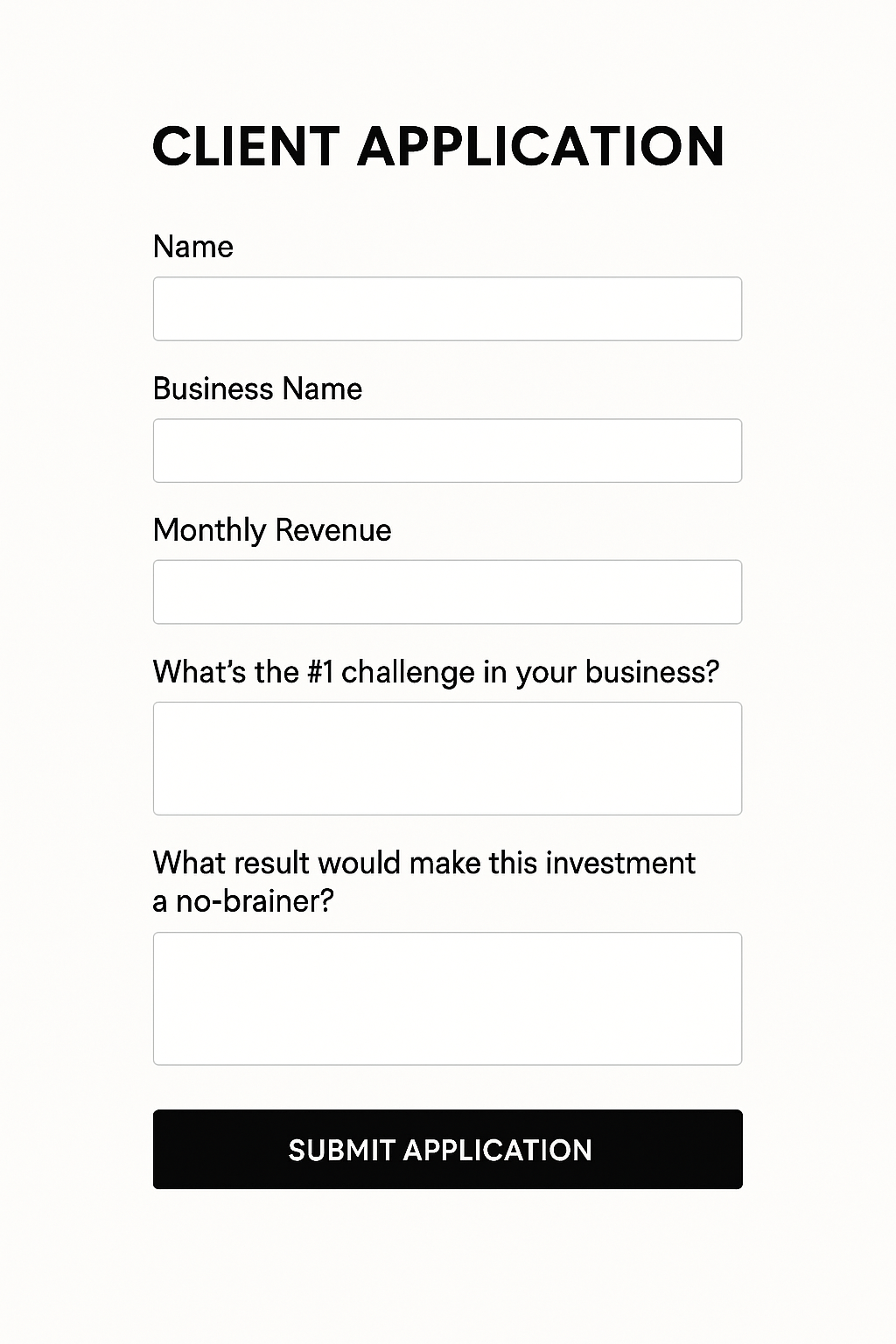
Mastering the High Ticket Sales Call
You’ve got the right offer. You’ve filtered the right client. Now comes the moment most entrepreneurs dread:
This call is the culmination of a longer, more complex sales cycle that requires building trust and understanding with the buyer.
And yet—this is where the best closers shine. They don’t “wing it.” They follow a proven framework to diagnose, lead, and close with absolute certainty.
The 5-Part High Ticket Sales Call Framework
This framework is designed specifically for closing high ticket sales by focusing on relationship-building and consultative selling.
- Pre-frame the CallSet the tone: “This isn’t a Q&A session. You’re the expert. They’re here to see if they qualify.”
- Diagnose the PainAsk strategic questions to uncover what’s really holding them back—emotionally, financially, and operationally.
- Create DesireShow them the future. Paint a picture of what life or business looks like with the problem solved.
- Present the Offer with CertaintyNo backpedaling. No price hesitation. Deliver your sales pitch with clarity, simplicity, and strength.
- Close Without PressureThe right client won’t need pushing. They’ll feel the truth in your offer and say, “This is exactly what I need.”
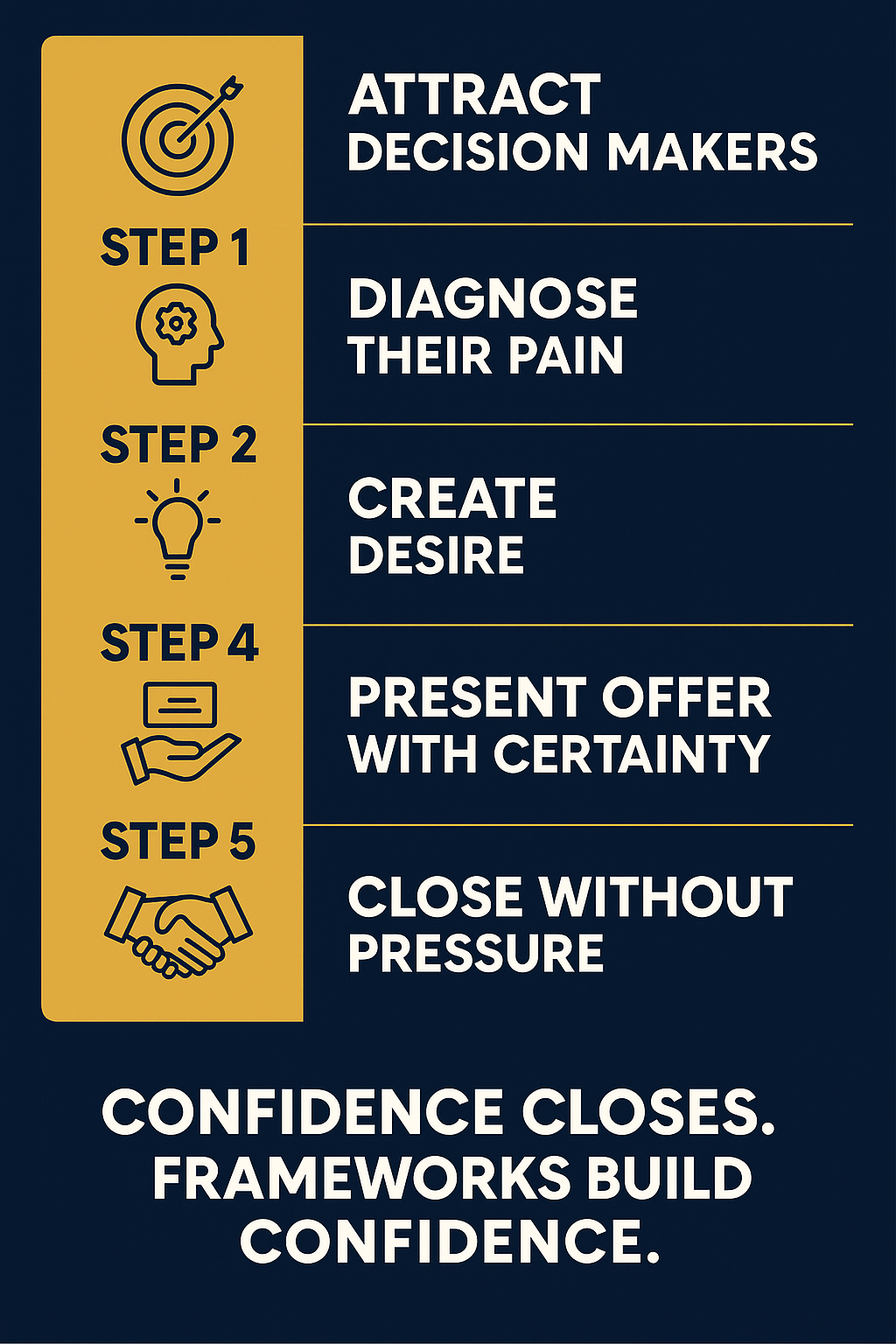
Becoming a High Ticket Sales Closer
If you’re serious about closing high ticket deals, you need to evolve from a coach or consultant into a trusted advisor.
That means:
- Listening deeply
- Challenging assumptions
- Leading with authority
- Staying composed when objections surface
When selling high ticket sales, a consultative approach is essential—addressing client needs and positioning your offer as the ideal solution to justify the higher price point.
Because closing high value deals isn’t about pressure—it’s about leadership.

Mastering high ticket sales isn’t about being slick. It’s about being clear, calm, and committed—so the client can feel safe saying yes.
Cross Selling and Upselling in High Ticket Sales
Want to boost your revenue without chasing more leads?
Master cross selling and upselling.
But let’s be clear—this isn’t about stacking random add-ons or pushing extra features.
It’s about deepening the transformation.
When you truly understand your high ticket clients—their pain points, blind spots, and long-term goals—you’ll naturally uncover opportunities to deliver even more value. That’s where cross selling and upselling become part of a powerful high ticket sales strategy.
- Cross selling is about offering complementary solutions that accelerate or reinforce results
- Upselling is about upgrading clients into a more premium version of your offer with a bigger outcome
And when done right, it’s not a hard sell—it’s a natural next step.
For a high ticket sales closer or sales team, this is about showing up with certainty, not desperation. It’s about being the trusted advisor who sees what the client needs next—often before they do.
Deliver more value. Increase customer satisfaction.
And drive more high ticket sales—without more effort.
Because the goal isn’t to sell more stuff.
The goal is to help your premium clients go further, faster—and stay in your ecosystem longer.
Sales Automation for High Ticket Offers
When you’re closing high ticket deals, every minute matters.
That’s why the top closers don’t waste time chasing leads, writing endless follow-up emails, or playing calendar ping-pong.
They use sales automation—strategically.
Automation isn’t about removing the human touch.
It’s about removing the busywork—so you can focus on what actually drives revenue:
high-impact conversations with high ticket buyers.
Here’s what smart automation looks like:
- Lead generation that attracts the right prospects while you sleep
- Appointment scheduling that eliminates the back-and-forth
- Email sequences that nurture leads and pre-frame the sale
- Sales engagement tools that keep potential clients moving through your funnel
But remember—high ticket sales are not just a transaction.
They’re built on trust, precision, and personalization.
Use automation to support your sales process—not replace it.
Because no CRM or chatbot will ever close a $25,000 deal like a skilled, human high ticket sales closer can.
Want more high ticket sales? Spend less time chasing… and more time closing.
Common Mistakes to Avoid in High Ticket Sales
Selling high ticket products isn’t about talking more. It’s about removing friction—and most entrepreneurs do the opposite.
A successful ticket sale depends on identifying ideal buyers and understanding their decision-making process.
Here are the top mistakes that sabotage big deals:
Selling Features Instead of Outcomes
Nobody pays $10K for “8 coaching calls.”
They pay $10K to fix a painful problem or reach a powerful outcome.
Fix: Always lead with the result, not the format.
Underestimating Customer Expectations
A potential high ticket client will judge everything: your onboarding process, your tone, your presence.
Fix: From your first email to your final call, every interaction must reflect premium quality.
Pitching Instead of Qualifying
You’re not trying to convince anyone.
If you’re explaining or justifying, you’re chasing the wrong lead.
Fix: Filter harder. Frame the call. Control the tone.
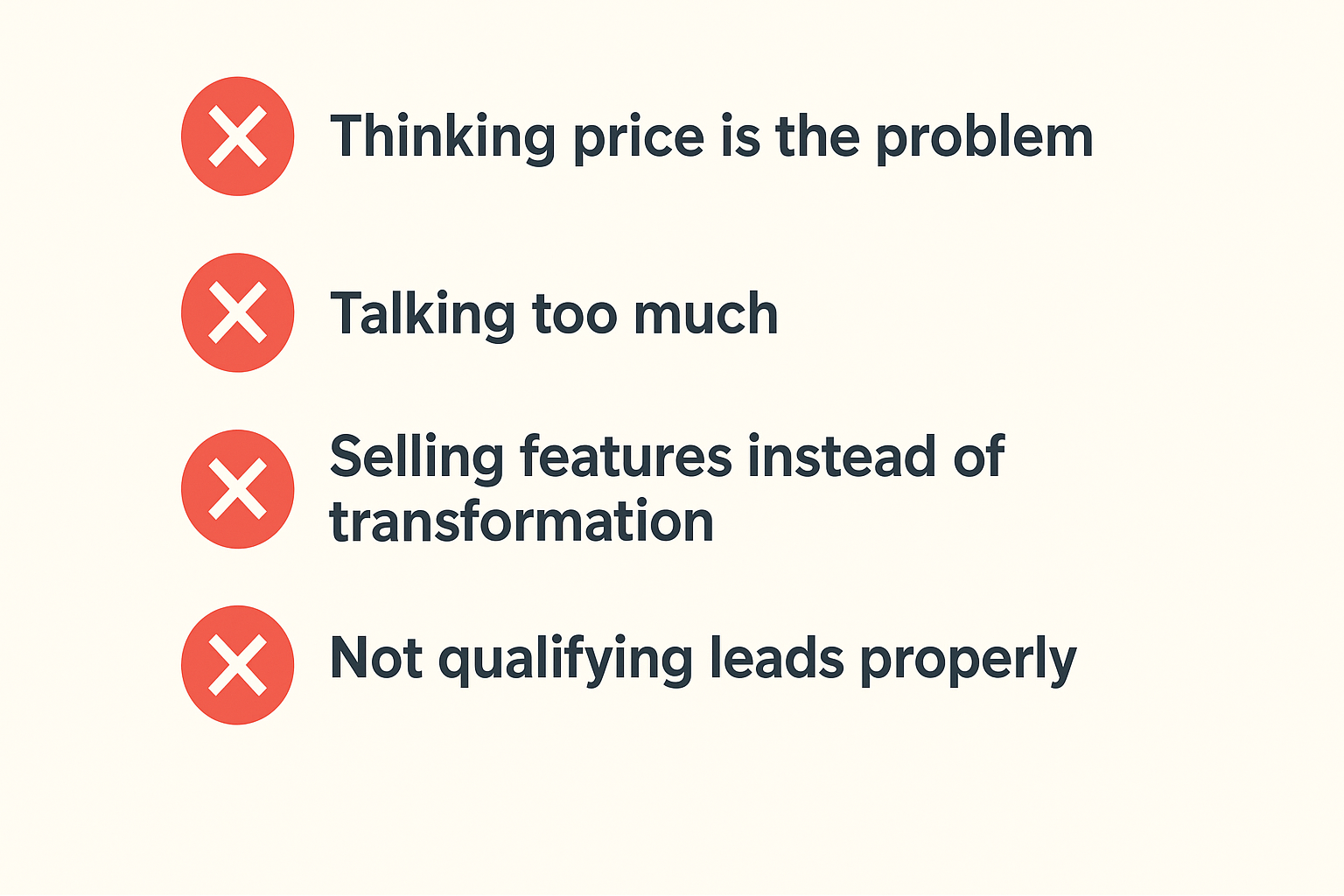
Final thought:
If you’re selling high ticket items, stop thinking like a seller—and start thinking like a selector.
You’re not for everyone—and that’s the point.
Measuring Success in High Ticket Sales
You can’t scale what you don’t track. And if you’re serious about mastering high ticket sales, you need more than just closed deals—you need clear sales targets and performance metrics. Tracking each high ticket sale helps you understand what defines a high-value transaction in your industry.
Here’s what the best sales teams measure:
1. Revenue Per Client
Forget vanity metrics. Track how much value you’re extracting per client. This is where high ticket offers shine—substantial revenue with fewer clients.
2. Sales Conversion Rate
How many qualified leads turn into clients? If you’re under 20%, it’s time to tighten your sales process.
3. Customer Satisfaction
Don’t just focus on the sale—focus on what happens after.
High ticket clients expect results. Follow up, get feedback, and improve your delivery based on real outcomes.
Bonus Tip: Review Your Funnel Weekly
Whether you have a full sales team or you’re closing deals yourself, regular funnel reviews help you catch leaks before they become costly.
Track:
- Drop-off points in your funnel
- Sales call objections
- Client retention & referrals
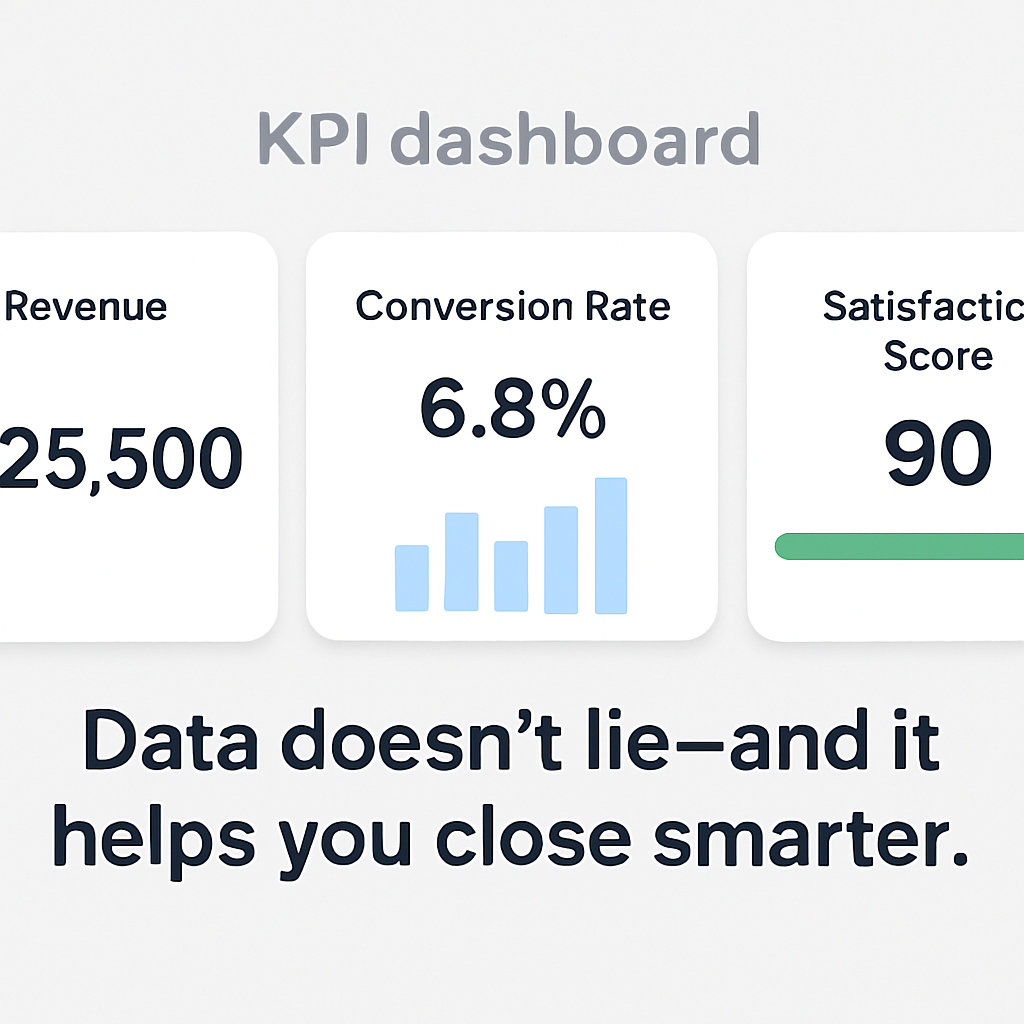
Measuring success isn’t optional.
It’s how you evolve from high ticket hopeful… to high ticket pro.
Continuous Improvement: How the Top 1% Stay Ahead in High Ticket Sales
In high ticket sales, good is never good enough.
The top closers, consultants, and sales teams don’t just execute a sales strategy—they refine it relentlessly. They review every win, every loss, and every pattern in their ticket sales data to figure out what moves the needle—and what doesn’t.
If you’re serious about mastering high ticket sales, here’s the mindset shift:
Your process is never finished. Your edge is never permanent.
That means:
- Tracking the full customer journey from first contact to close
- Getting real feedback from high ticket buyers
- Upgrading your sales process to match changing buyer behavior
- Replacing assumptions with data and results
And most importantly—never losing sight of the end game: delivering a premium experience that exceeds customer expectations and drives elite customer satisfaction.
Want to dominate this space long term?
Make continuous improvement part of your brand DNA.
Because in the world of high ticket sales, the moment you stop evolving… someone hungrier replaces you.
The Future of High Ticket Sales
High ticket sales are evolving—and fast.
The old-school model of in-person pitch decks and boardroom negotiations is being replaced by remote high ticket sales, where deals are closed over Zoom calls, Slack threads, and personalized Loom videos. For example, enterprise software is a high ticket product that often requires a sophisticated, remote sales approach due to its scale and customization for large organizations.
Today’s buyers expect more than ever—and they expect it faster.
What’s Changing in the High Ticket Landscape?
- Digital-First Trust Building
Buyers research you before they ever speak to you. Your online presence must reflect authority, results, and professionalism. - Speed & Simplicity
Complex, bloated sales processes are being replaced by streamlined journeys. Fewer steps. Faster results. - Exceptional Customer Service Is Non-Negotiable
The bar is high—and getting higher. Every touchpoint matters. If you want to stay competitive in high ticket direct sales, your service must feel personalized, responsive, and elite.
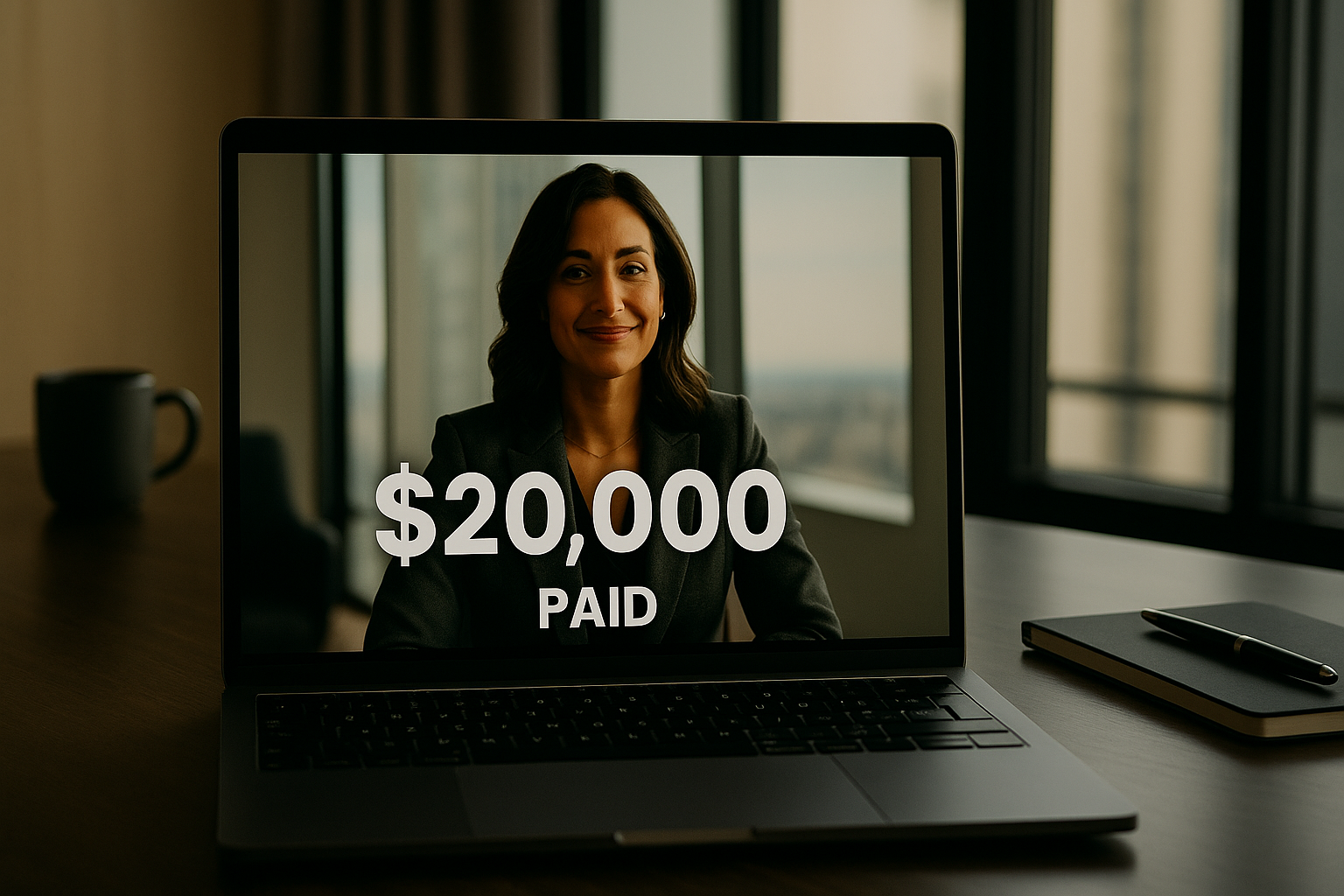
The sales teams and consultants who adapt to new buyer behavior—and exceed their expectations—will dominate the next decade of high ticket growth.
Because while tools may change, one thing never will:
People will always pay more for trust, transformation, and certainty.
Final Thoughts: Ready to Go High Ticket?
If you’re still chasing low-ticket buyers, launching every month, and grinding just to stay afloat—
you’re not running a business. You’re stuck in a loop.
High ticket sales are the way out.
They give you leverage, impact, and freedom—with fewer sales and better clients.
More revenue per deal
More aligned, premium clients
More time to actually deliver results
More high ticket sales—without chasing or begging
The question isn’t if high ticket works.
It’s when you’ll decide to commit to it.
Ready to Build an Offer That Attracts Premium Clients?
If you’re serious about scaling with fewer clients, bigger deals, and no more chasing—
join the S.M.A.R.T. Challenge.
This isn’t a generic sales training. It’s a proven, step-by-step system for:
-
Creating offers that convert at premium prices
-
Attracting high ticket clients consistently
-
Closing deals without pressure or discounting
Click here to join the S.M.A.R.T. Challenge now—and learn how top closers land premium clients with total confidence.


